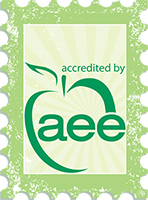2023 Arctic to Atlantic Winter Semester Blog #7
As we are putting the finishing touches on our river expedition packout, here are our most recent stories and final reflections from our time at Maine Local Living School!
Homestead Activities – By Lilah
The season is changing and the chores on the homestead with it! Since you’ve last heard from us, we’ve moved on from emptying sap pails and on to mushroom inoculation. Our morning chore block is filled with drilling holes into logs, stuffing them full of mushroom spore, and then finally sealing them with wax. Next fall, these logs will be blooming with beautiful and tasty shiitake mushrooms!
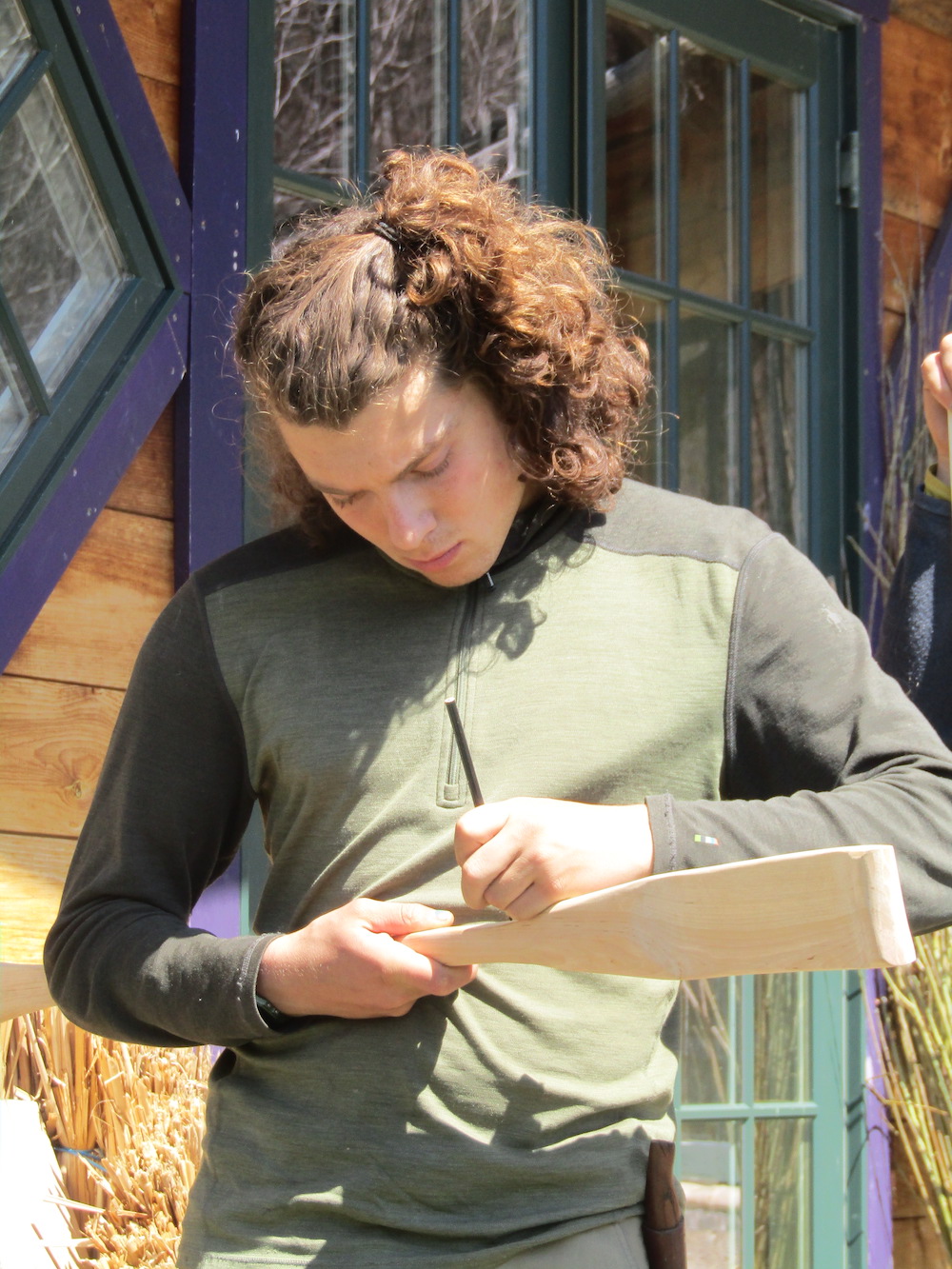
Ely working on the curves of their paddle
Another experience we’ve had in the past week has been learning how to eat acorns. Maine Local Living School’s mascot and Chris’s favorite food, acorn flour is super hearty and simple to make. MLLS has a special hand-cranked machine that cracks open the shells; separating these from the edible nut is as simple as dumping everything into a bucket of water and watching the shells float to the top. The final steps are to grind the leftover nuts into a fine flour and then leach the tannins from the flour with water for 8 hours. At last the acorn flour is ready for baking. Acorn pancakes? Muffins? The possibilities are endless!
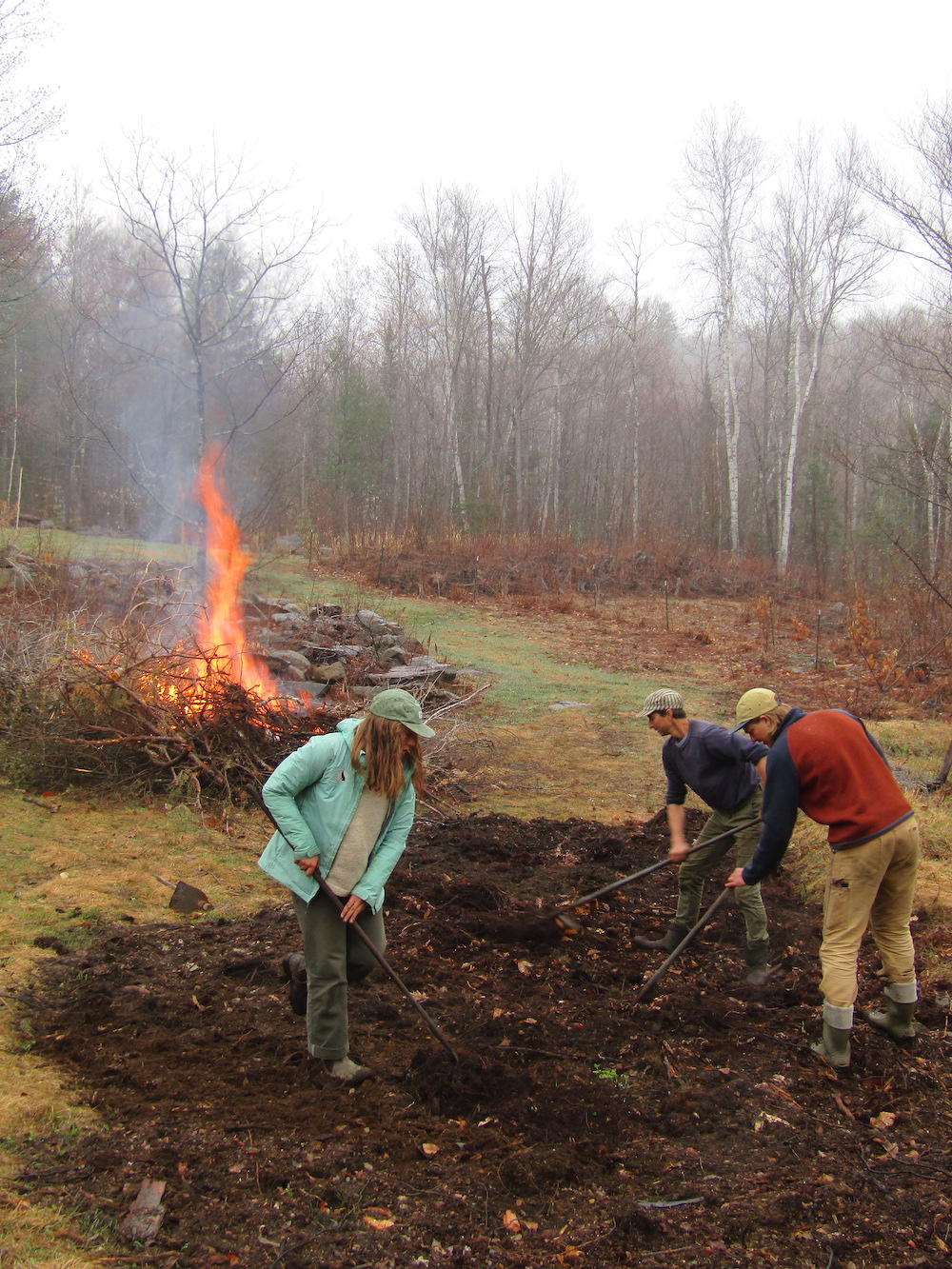
Bria, Chris and Matias raking on the homestead
Miso Workshop – By Ian
On April 22nd, Maine Local Living School opened its doors for a miso making workshop. In the morning, our teacher, Nicholas, arrived. He brought multiple five gallon buckets, a couple of giant mixing bowls and an industrial-sized scale. Wasting no time in taking over our kitchen, he began boiling many pounds of soybeans in our largest pots. He joined us for lunch and we learned more about his miso business. His wife is Japanese, and when she moved to the U.S. and didn’t like any of the miso here, they set out to make their own.
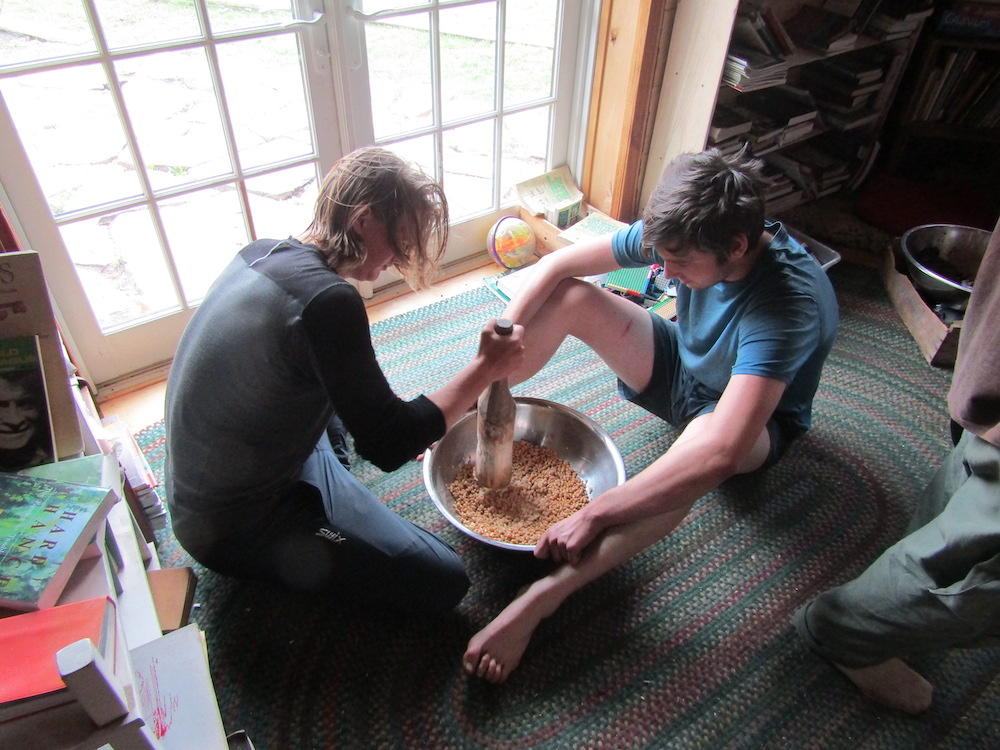
Matias and Ian making miso
After lunch, the rest of the class showed up. Nicholas started by opening up a jar of black, mushy miso paste he had made three years prior. I was skeptical at first, but after just one bite I knew it was something special (we snacked on the jar for the rest of the class). He went on to explain more about miso: it’s a traditional japanese ferment made up of just three ingredients: koji (rice that has been inoculated with a special fungus), soy beans, and salt. It’s a base for most Japanese foods and has been for thousands of years. He went into greater detail about making koji, inoculating rice and monitoring its temperature over a 30-hour period in a cedar-paneled room, and about using fermentation to create a community of beneficial, healthy microorganisms.
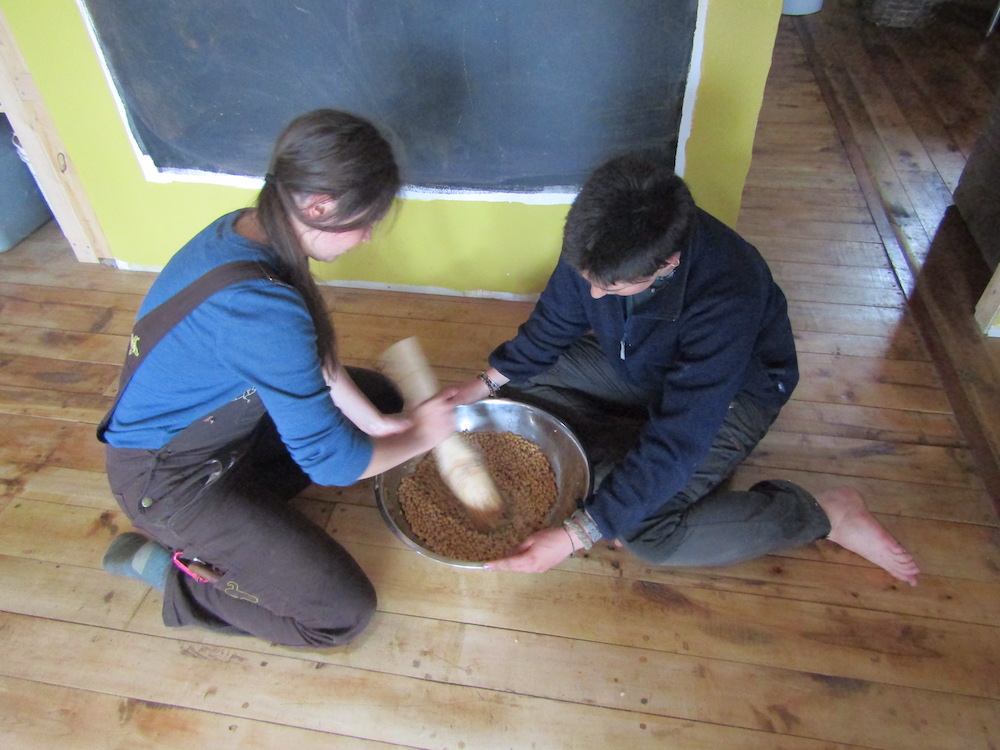
Laura and Lilah making miso
After our lesson, we measured some soybeans by weight, crushed them to a paste, and added koji. Then we added a honking amount of salt and kneaded mixture with our hands. After lots of mixing, we had a giant bowl of almost miso; the only thing left to do was package it. The miso was rolled into tennis ball-sized chunks to smoosh out all of the air. We compressed these into jars and started our countdown for a year! (The plan is to reunite at MLLS and eat miso! Nicholas said that miso is the harmonizing agent and that all our energies will blend and complement each other in the fermentation.)
Paddle Making – by Ely
As we are getting ready to depart for the Penobscot River we have finally finished our paddles, the key to navigating this waterway by canoe!
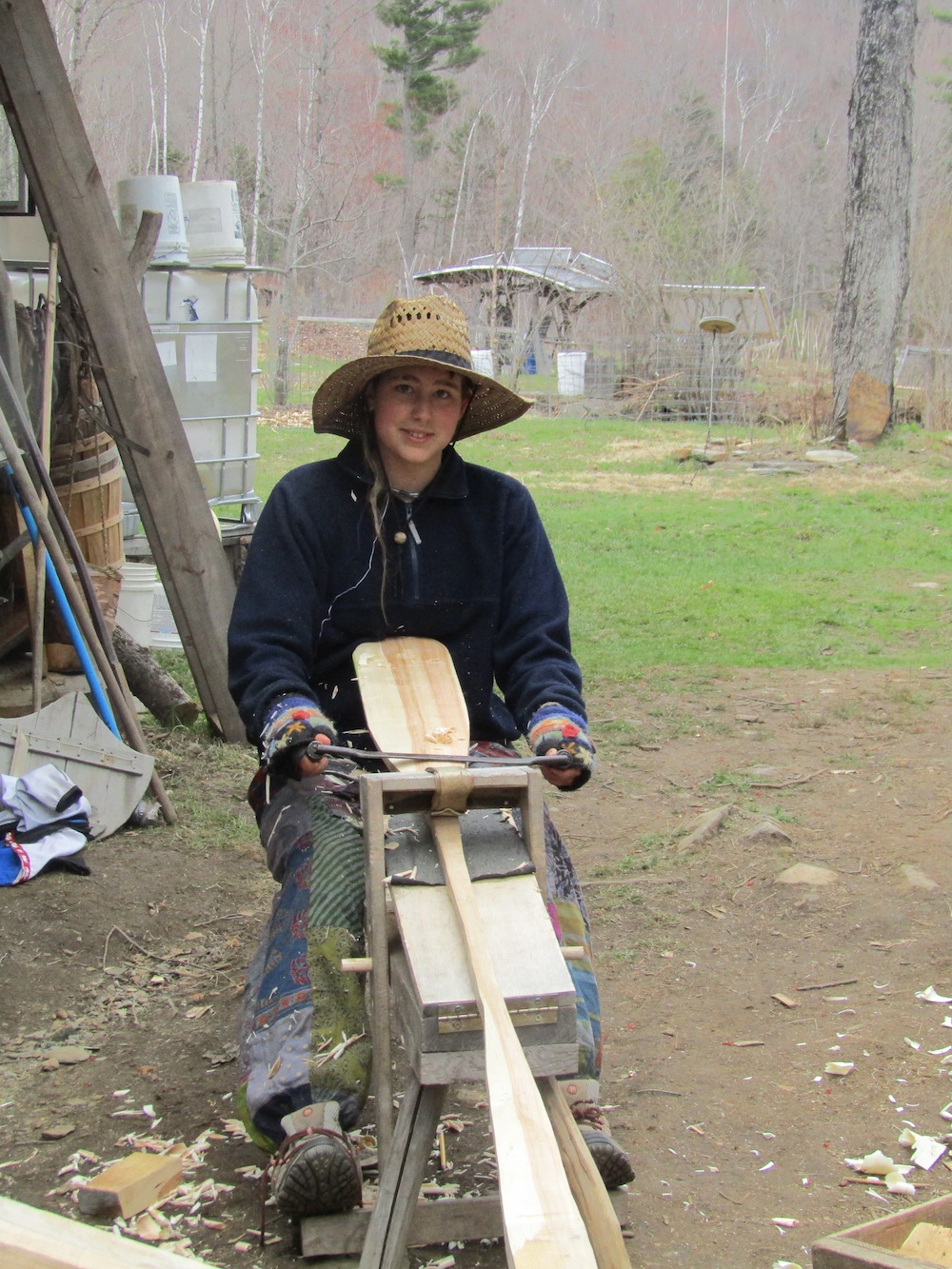
Lilah, the drawknife and her paddle
Our process began many weeks ago with each of us selecting a birch board from a stack milled by Chris a year ago for this purpose. We used birch because it has a good blend of durability and workability, while being fairly light and very straight grained. I chose a piece that had a swirl of beautiful heartwood, especially along the blade of the paddle.
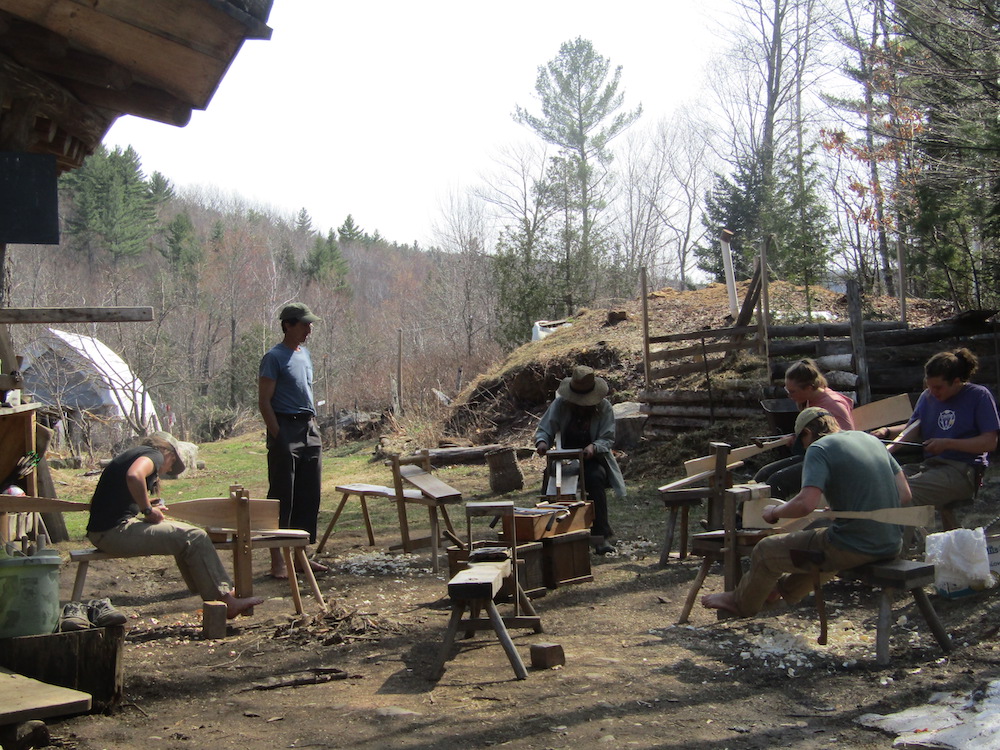
Using a combination of axes and saws, we cut our paddles down to the rough outline of their final shape. Then we used drawknives (large knives with a single bevel and two handles) and clamped down our paddles with shave-horses. This combination allowed us to remove material from our paddles quickly but precisely; oftentimes, however, our paddles had other things in mind, thwarting our attempts to carve them with ever so slight waves in their grain.
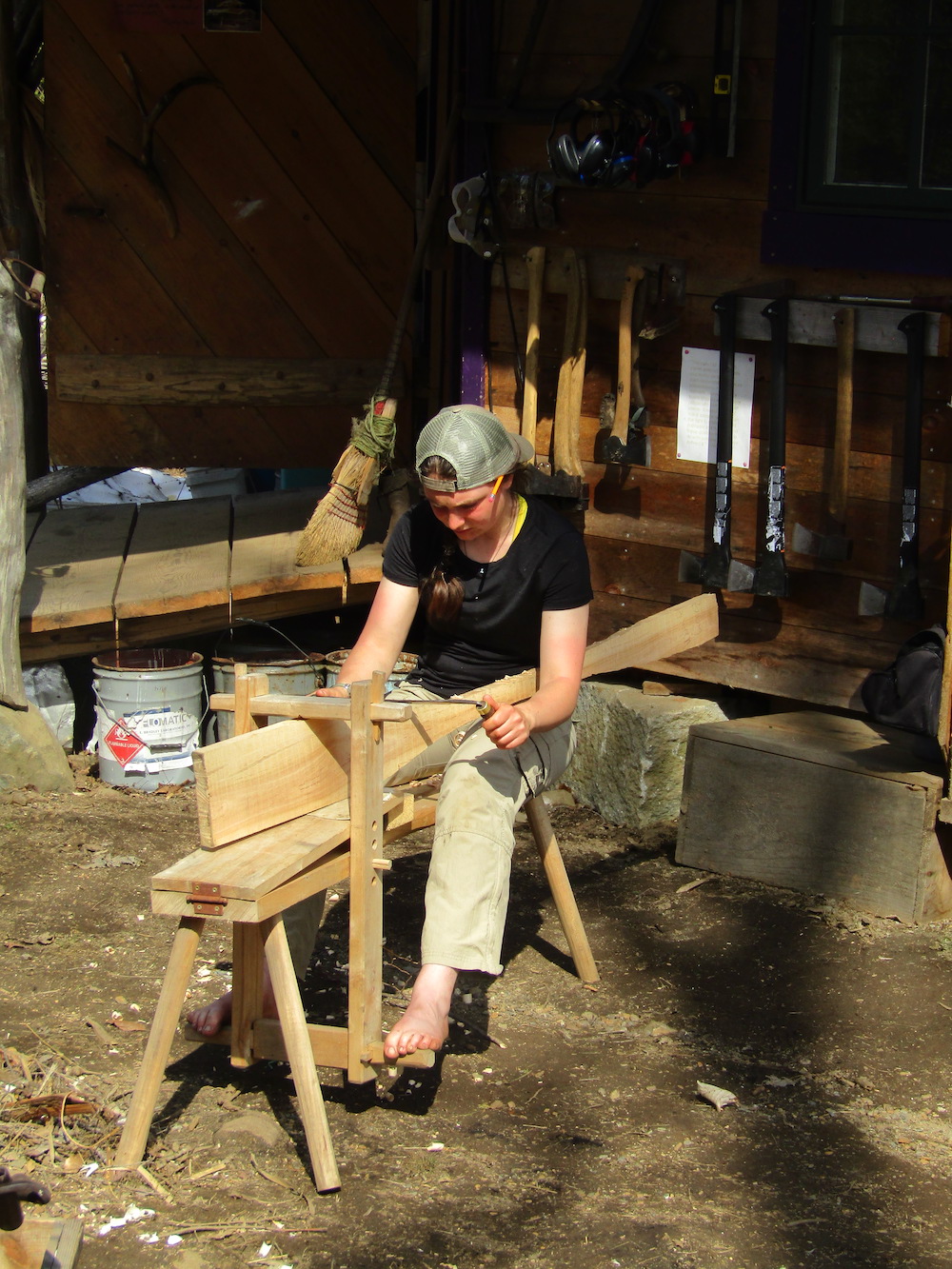
Laura, the shave-horse, and her paddle
After that, we used spokeshaves, a combination of a drawknife and a block plane, to smooth out any ridges. Lastly, a variety of tools were used to finish the top of our handles, and then it was time to sand! In the spirit of our community as WSP, “wizard snake potatoes” were drawn onto each paddle in addition to other decorations.
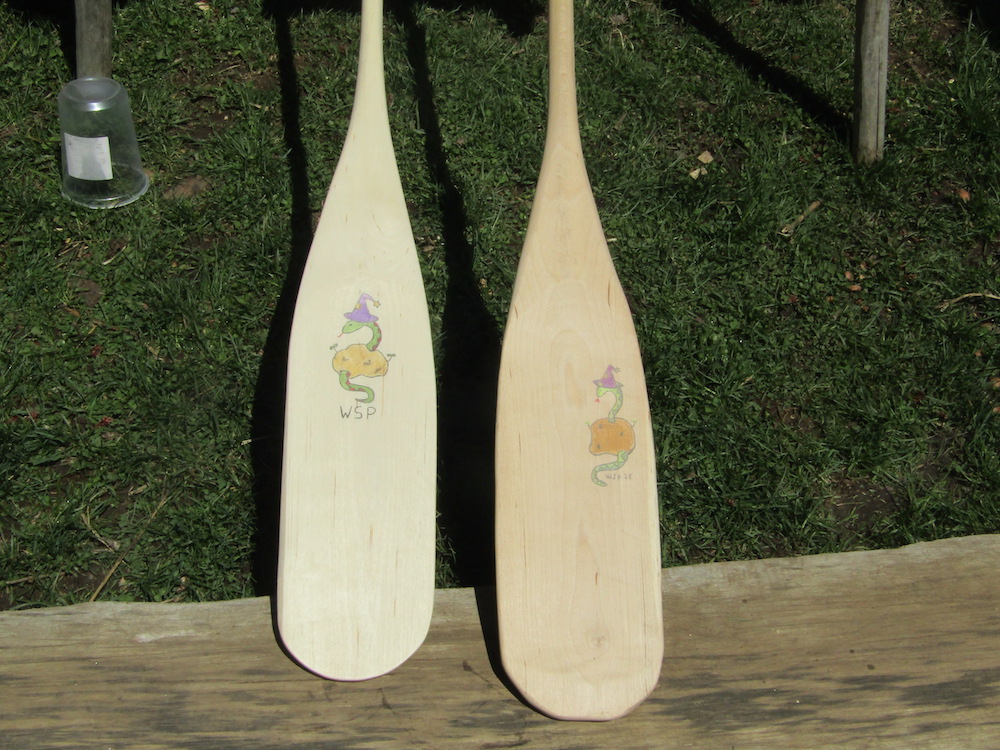
WSP Mascot: Wizard Snake Potato
Finally, a couple of coats of varnish made our paddles river-ready!
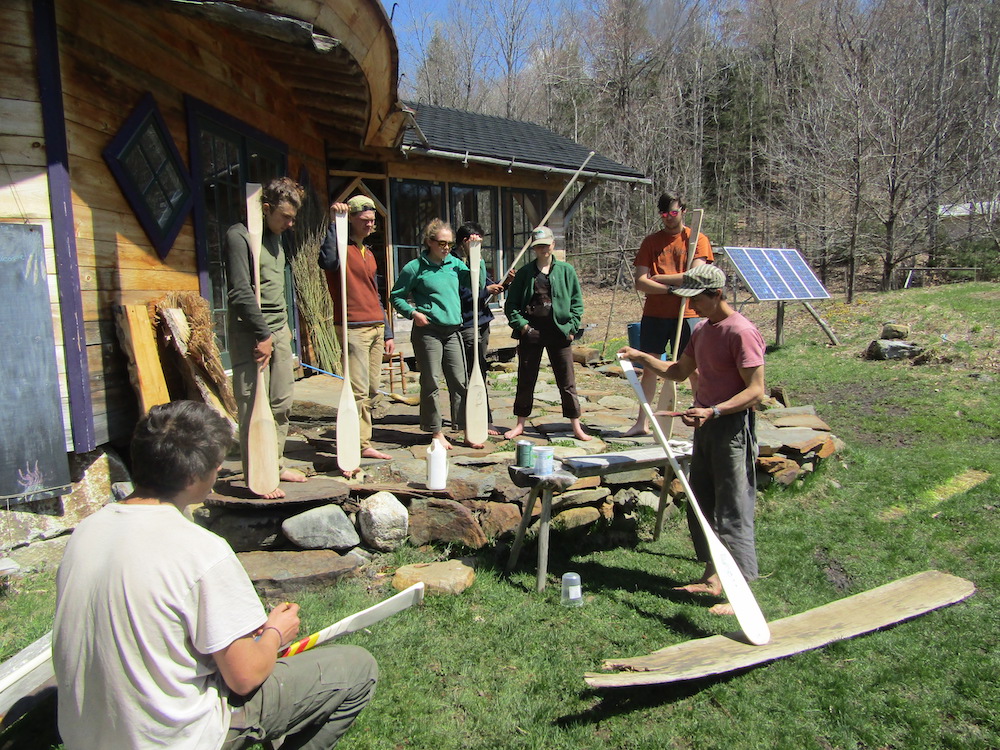
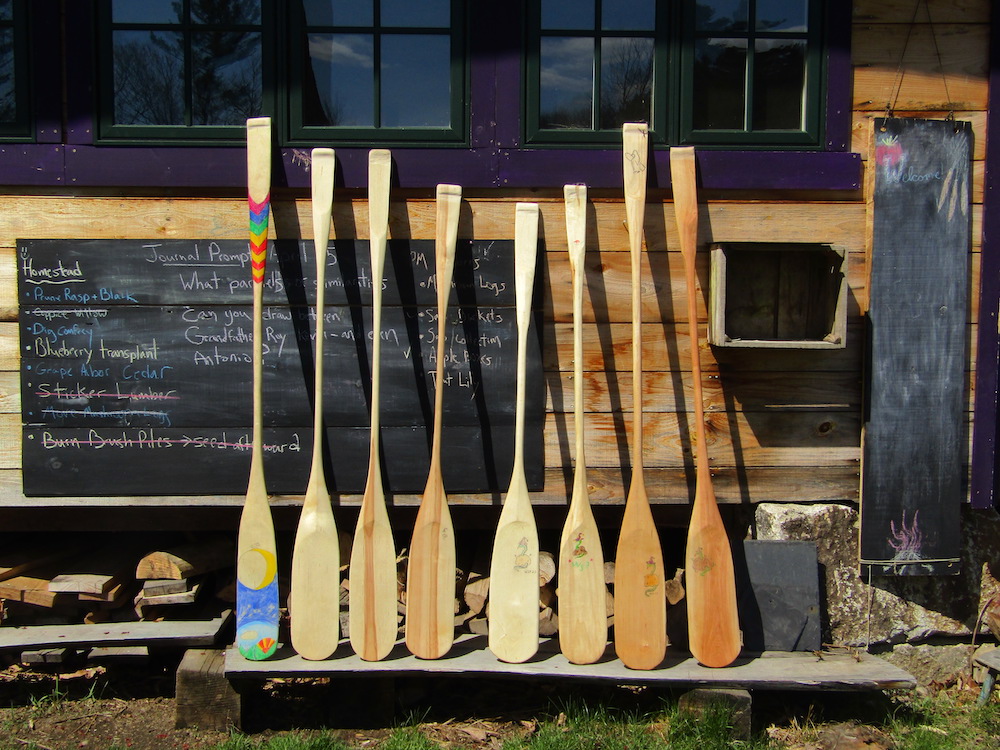
Teaching at Kingfield Elementary – by Bria
T’was a rainy and cold morning, and I woke up and remembered we were headed for Kingfield Elementary. After a rushed morning–since three out of the four of us who were going accidentally slept in–we got in the van and headed 45 minutes north.
The day was split into three chunks, and during each we worked with a different group of students. First were the second graders and half of the third grade. Next, there was the rest of the third grade and all of fourth, and finally the kindergarteners and first graders. With each group we had two stations: Chris was teaching about splitting ash strips, and kids worked on shave-horses to make mallets; Ely, Laura, Lilah, and I were at the pounding station. Here we taught the kids how to pound and figured out ourselves how to keep it engaging for them. The best strategy I came up with was making it into a game/competition where each person takes their turn and everyone counts along with each pound. The goal was to do it at least five more than the last person.
Near the end of our time with each group, we’d come together and all do some weaving. I was working with a third grader on her weaving at one point and I started humming to myself. She got super excited by this and insisted that I sing to her. It was fun to be with small people and see and appreciate their curiosity and excitement. For the kindergarteners and first graders, we also acted out a day on the winter trail with them; it was so fun to engage their imaginations in this way. We all ended the day tired but very happy.
Contra Dancing – by Cole
On Sunday, April 23rd, we had a special treat! My god father, John McIntire, came with a band and played us a contra dance.
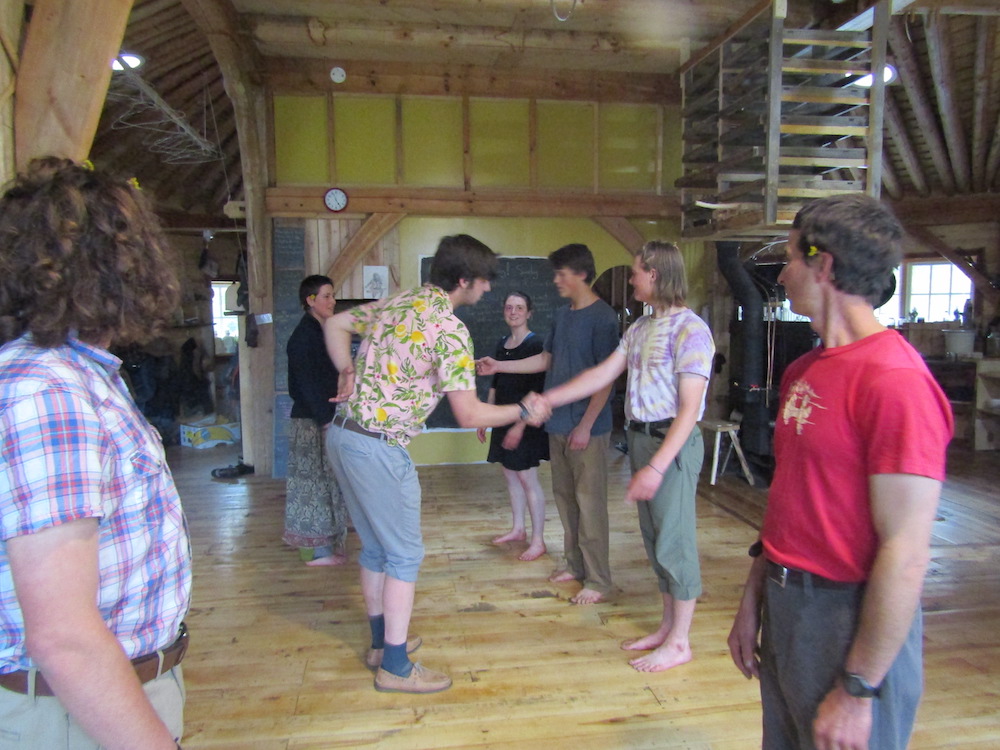
The contra dance begins!
The dance was so much fun, we did a bunch of dancing in circles and rows. John also brought his wife, Nancy, and it was so cool to see these people that I respect and admire so much.
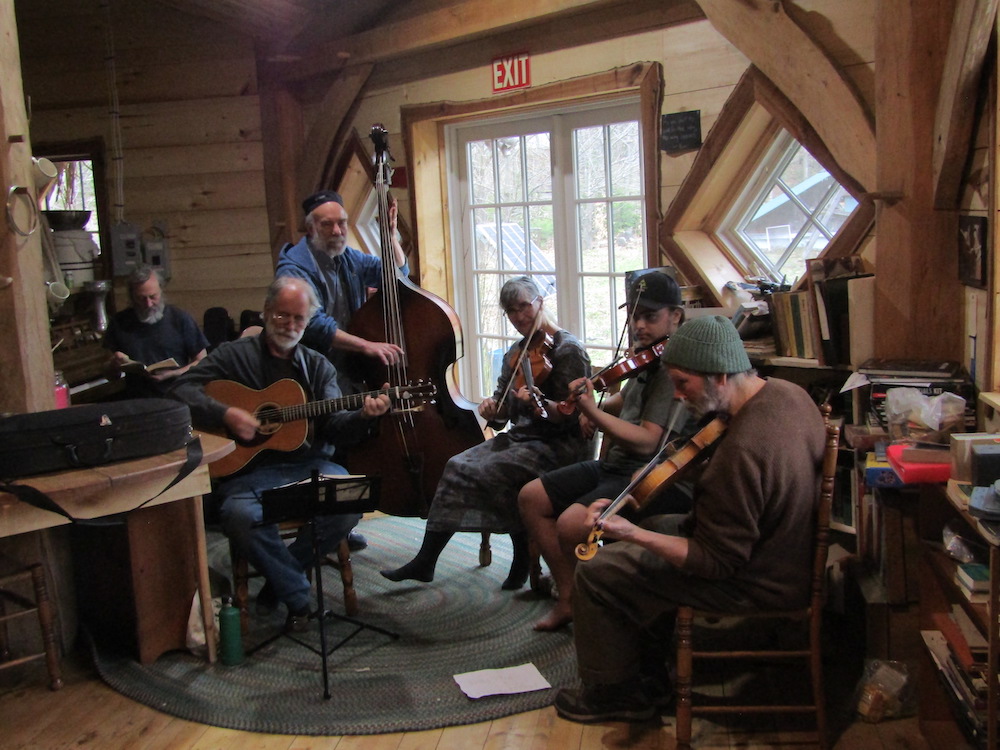
After dancing, we sat and told stories around dinner. The members of the band had lots of interesting thoughts and stories about their time playing folk music. Dinner was squash soup with salad, and John brought an ice cream cake from John’s Ice Cream (not the same John), and all I can say is that all of the good things I’ve heard about John’s Ice Cream were confirmed.
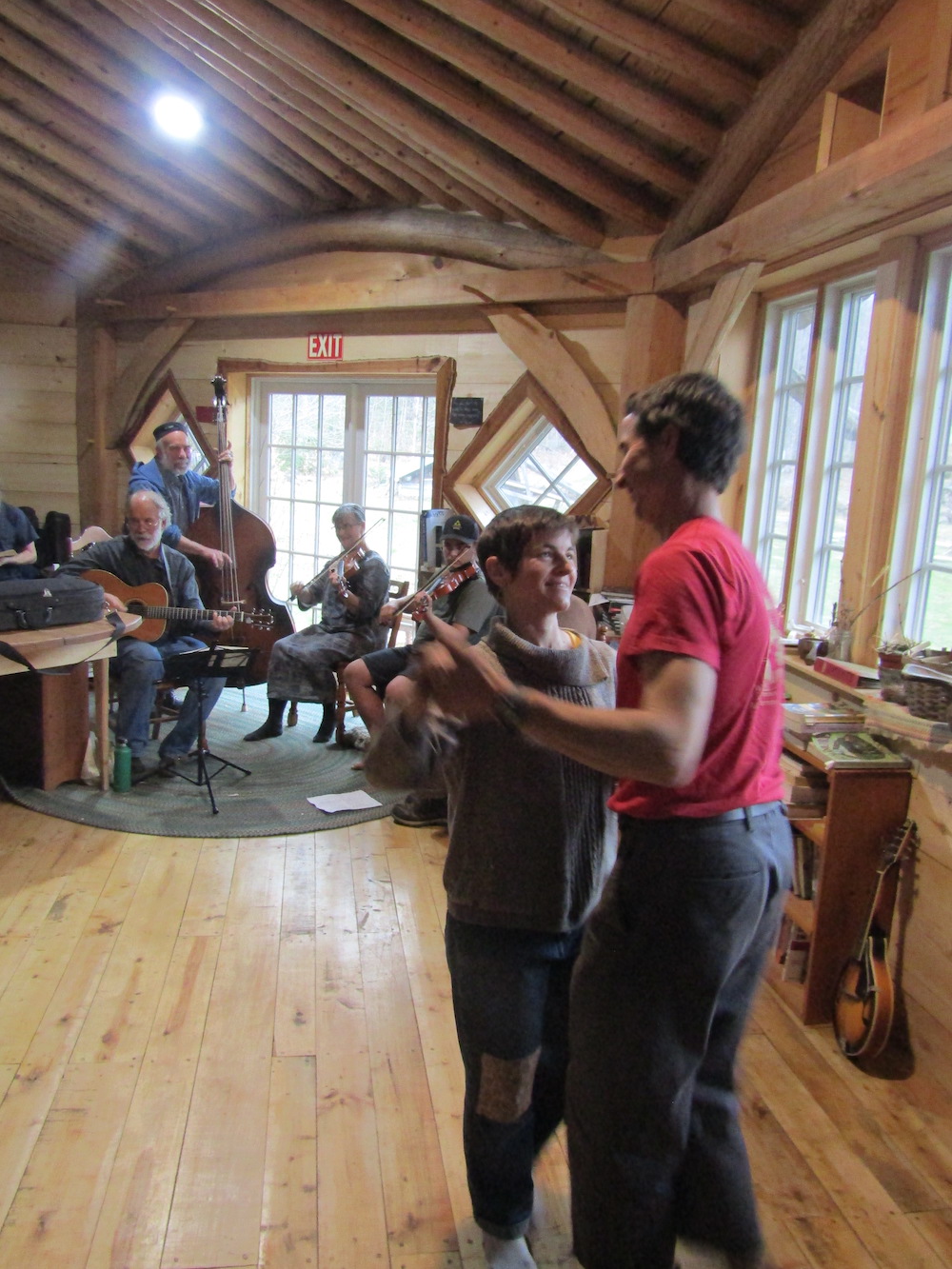
Ashirah and Chris, cutting a rug
Music – a poem by Lilah
I will always remember the music
Nick’s guitar playing
Chris on the fiddle
Everyone’s out-of-pitch voices blending into a single song
Our resident CD player’s cheap cherry red speakers
Blasting Beastie Boys and Beatles
The ever-growing community that gathers with music
Person by person, note by note
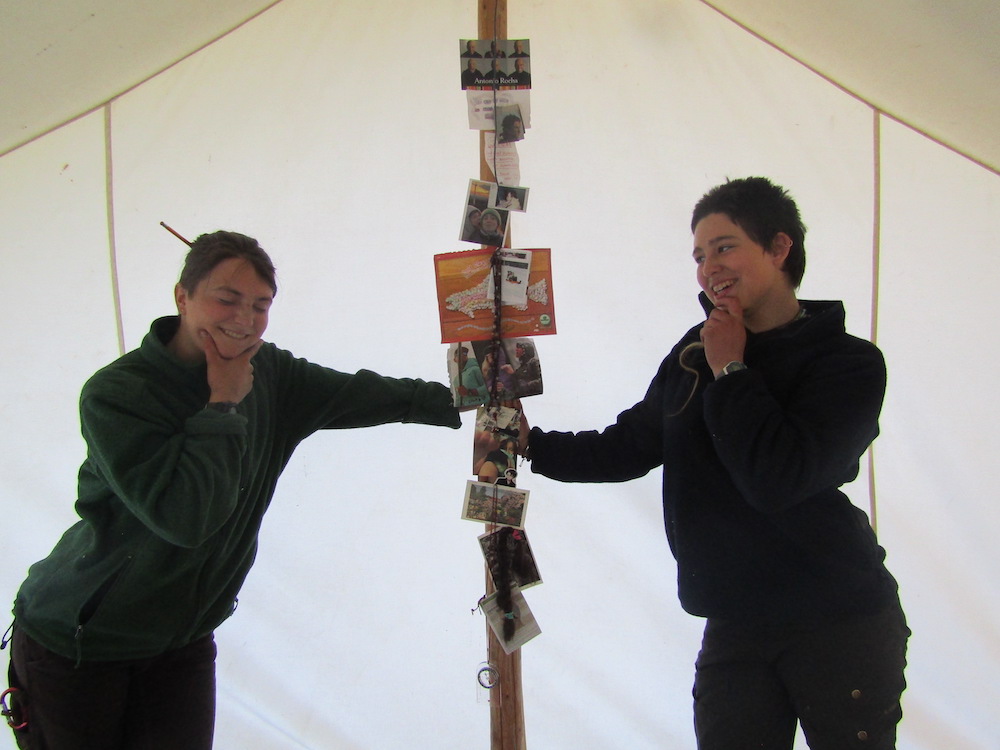
Laura and Lilah in their dwelling
Solos – by Laura
As a part of our time at MLLS, each of us were loosed into the woods with a tarp, sleeping bag and pad, knife, a little food, and a few other provisions like matches. We were to find our own spot a good distance from each other and return the next afternoon. Everyone quickly fanned out into the surrounding woods after lunch; some headed northeast towards the hemlock-clad banks of Ballard Pond, while some spread westward along a burbling stream.
Once at our spot, we set small shelters and sat. Everyone had something different in mind. Some continued sculpting their shelter, creating debris huts fit for kings. Others lit fires and cooked some of the bread and apples we were given, but for the most part we sat and listened. It was the first time in many months–and for some the longest stretch of time in our lives–that we had to be truly alone. There was no need to speak, it seemed enough to be an observer of spring, of the conversation between red-tailed hawks and the murmuring of the wind. Each of us was completely provided for in that moment. It didn’t rain, there was wood to burn and water to drink and an abundance of time. There was time to think until there were no more thoughts to think, just the quiet vibrance of growing things.
When we returned the next day, we felt significantly friendlier and calmer than when we had left. Everyone excitedly shared stories of animal glimpses, shelter techniques, and noticings from a quiet mind. There is great enthusiasm to do it again. We’re excited to continue the practice of looking closely, and, especially as we head towards the river, to feed that deeper feeling of connection to each other and earth.
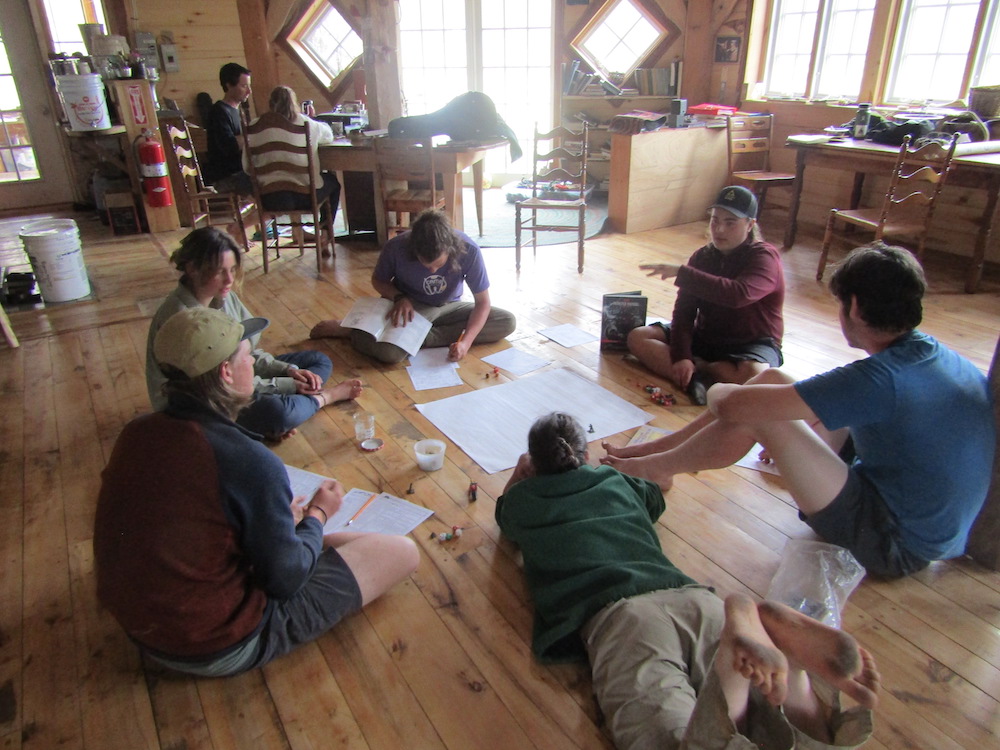
Owen Knapp and Semester students during class
Solos Reflections – by Cole
I felt at home with the earth during solos, specifically when I was sitting down by the pond watching it come alive with wildlife. I had a feeling of finding joy in simplicity, of just being able to sit and enjoy the world.
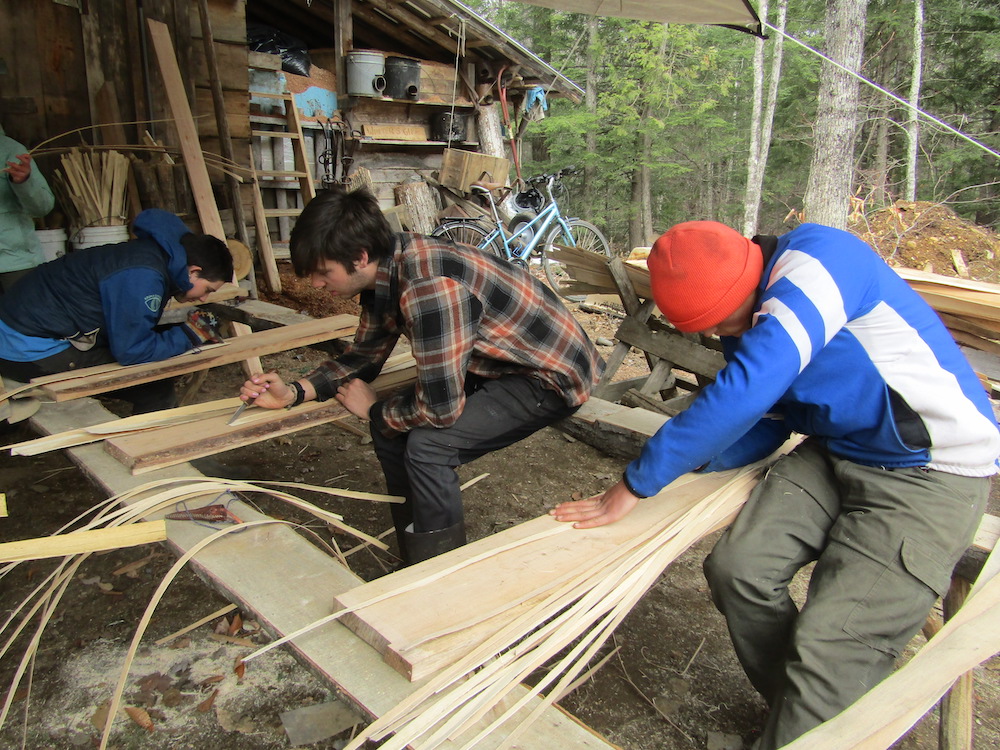
Lilah, Ian and Cole cutting weavers
Reflections on life at Maine Local Living School
Ely: One thing of importance to me is weather observation. It has been amazing to be able to just look at the sky and know things. Before coming here, I thought that complex systems and technology were necessary for any form of weather prediction. It was really eye-opening to see that they are not. I felt at home with the earth when I was finding someone with nice big cradling roots to be a bed for the night. I would step up to a tree and ask whether I could sleep there. It helped me learn how to ask.
Ian: I would have liked more time with Grandfather Ray. The little time we had with him was very impactful on my view of the world – in how to treat the forest, the idea of reciprocity, and rebuilding my own idea of what is wild.I will always remember the connection and feeling of oneness with the world that I felt while at MLLS. Between constant sit-spots, solos, and awareness of the spring changing – this mixed with interactions with Ray, reading Braiding Sweetgrass on my own and learning about Kinship with Chris. I have been forever touched.
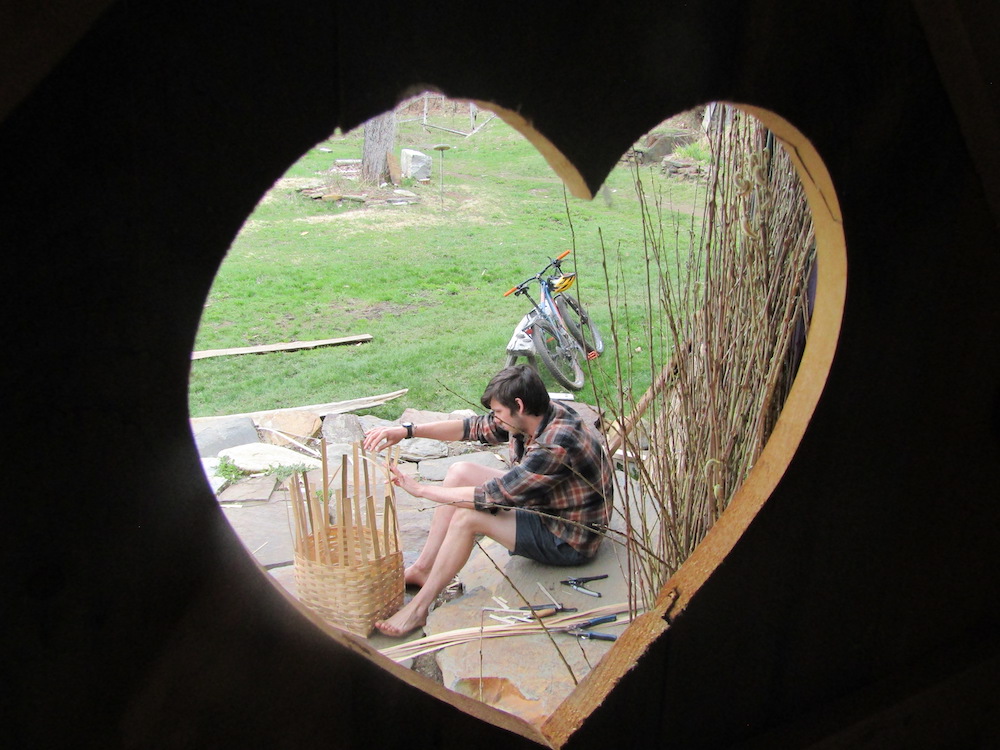
Laura: I learned you can live with the earth, that it is harder, and less convenient, and entirely possible.
Bria: I felt at home with the earth during solo’s. I was alone yet surrounded by all the other beings. There was so much life and joy and comfort in the land around me and I felt welcomed in that space. One thing I learned about myself is that I enjoy teaching and working with kids. Even working with the freshmen at the Ecology Learning Center, while it was difficult, I enjoyed it. Teaching is not something I have ever done before and had labeled it as something I did not want to do. Now I am thinking that outdoor education could be a really real possibility for me.
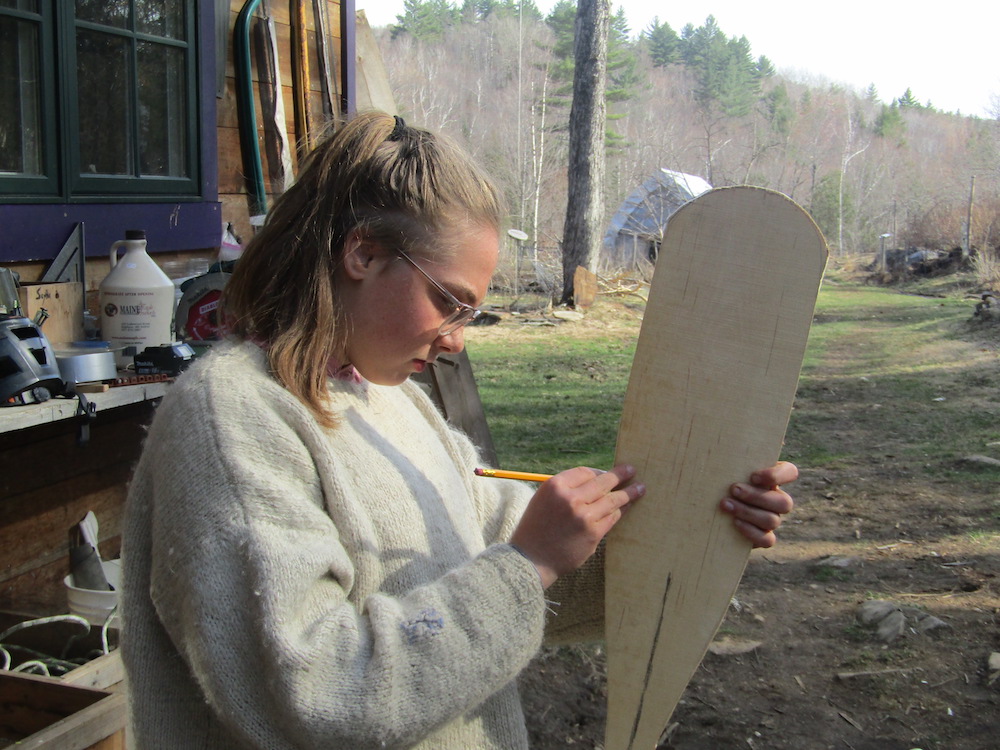
Matias: I felt at home with the earth when I started to weave pack baskets. I think that was the moment when I started to really think back through the process of making them and where the material came from. I thought about stripping the splints – straight grain with no hangnails. I thought about pounding splints off, the way the tree had grown and built itself, thick or thin. I thought about the cultural significance to the land that the ring (sound) of mallets brings. I thought about working with Grandfather Ray and having a conversation with the tree before cutting and carrying it out. I thought about how very long that tree had been standing there, what the forest looked like, what it had seen, and if it was there growing while Chris and Ashirah were there growing and learning on the same land. I thought how all this time and energy and experience woven into a basket carries more significance than the basket carries stuff. I will always remember sitting by the evaporator after having had a couple of hard days and singing as Nick played the guitar and Chris played the fiddle. It was really special to see the glow of the firebox light up the steam and join in on each song of Nick’s gospel medley.
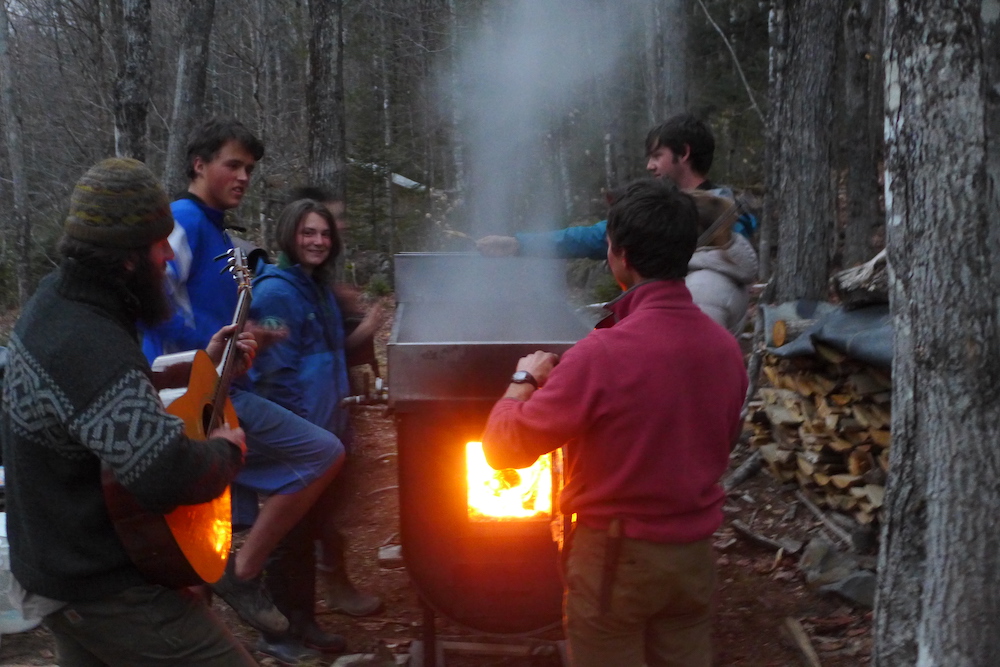
Digging – A Poem from Laura
I am digging
Up leaves
For a house.
I am digging
Up myself
Until I am
The dirt.
Until the heartbeat
On the wings of grouse
And the broken creaks
Of pine
Is not my own
But all I am.
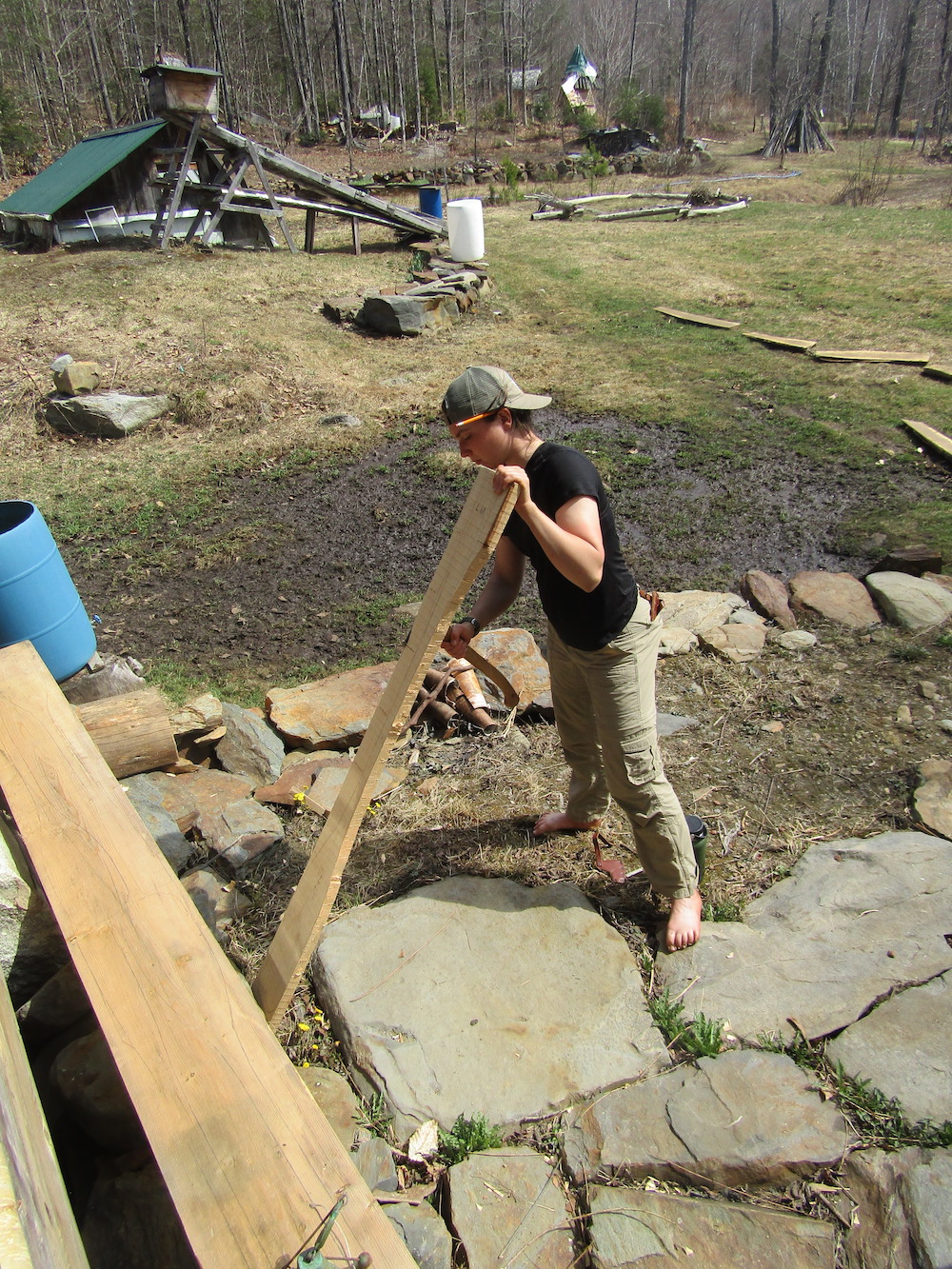
Packbaskets – by Matias
This weekend was all about tying up loose ends and wrapping up everything we need to be ready for the river. And making pack baskets. After cutting a brown ash tree in the forest on Grandfather Ray’s land, pounding these logs for many hours, and stripping the splints that came off, we were finally ready to weave all that hard work together.
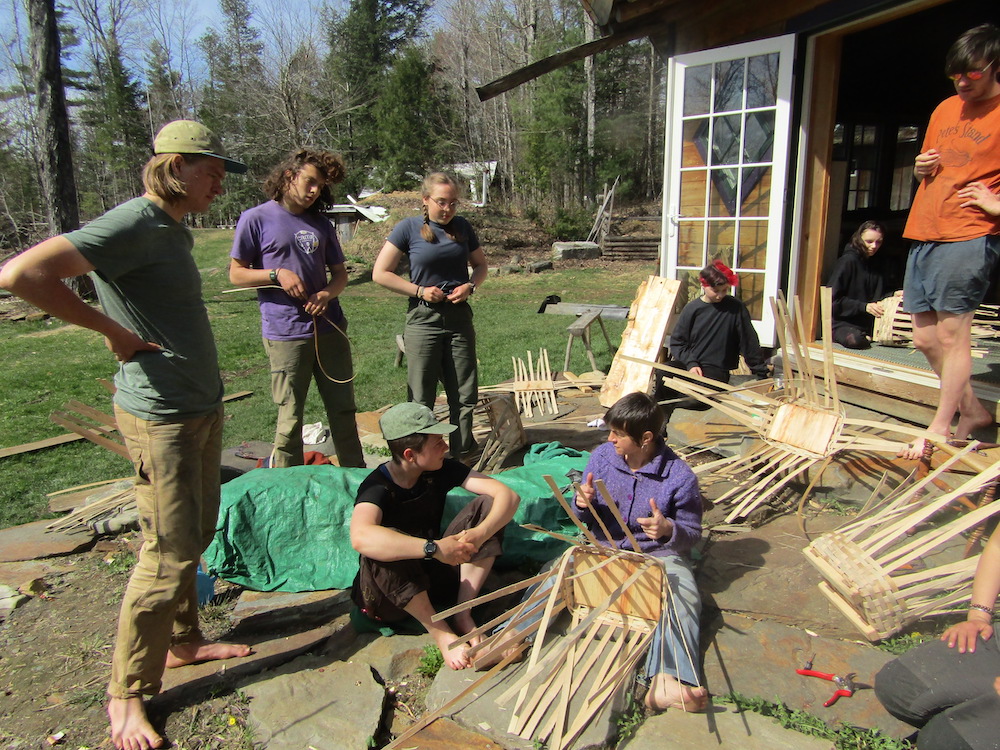
Our community grew larger as nine other participants in the packbasket class arrived bringing with them new energy and a diversity of interesting life experiences. We started by weaving the base of our baskets and turning the sides upright. Soaking the ash strips in the pond kept them pliable, and we started weaving round and round, over and under.
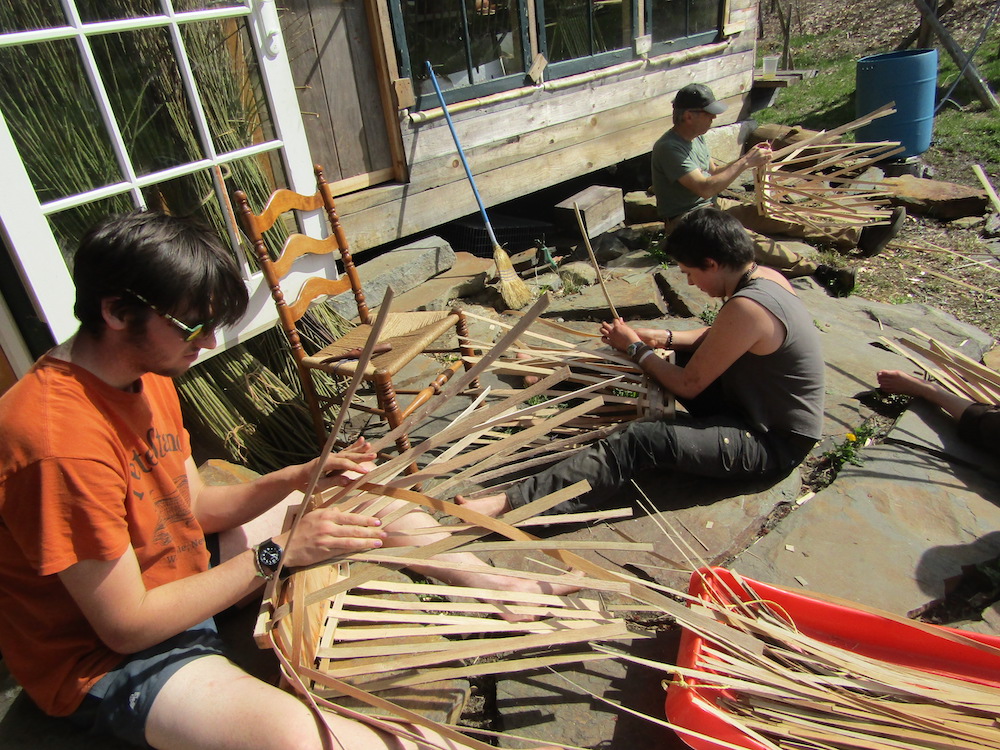
The sides of our basket began to form, bending uprights as we wove to give the basket shape.
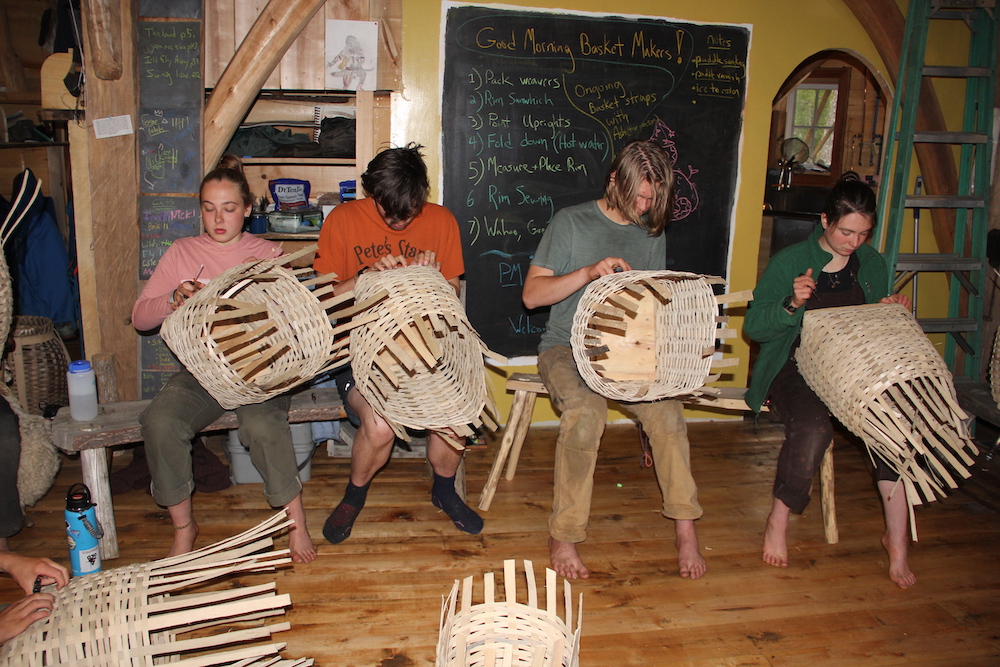
The second day of class was spent working on the rims. The top was sandwiched with two thicker pieces of ash. We made basswood cordage to line the top and sewed the top together with the thinnest ash strips we had. With webbing straps cut and riveted to form shoulder straps, our springtime packs were at last complete!
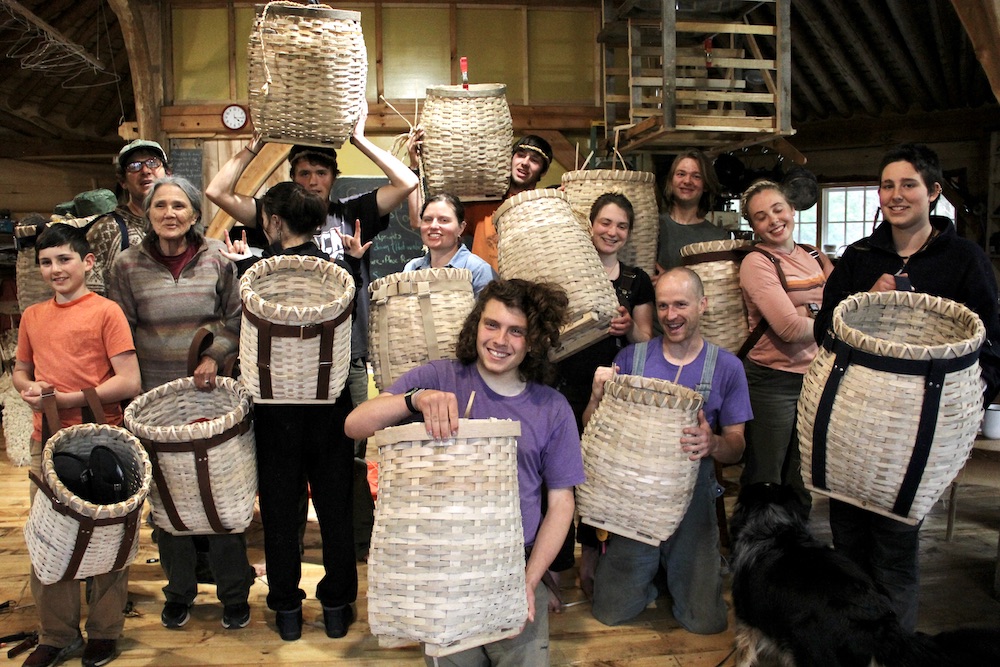
Packbasket Encounters – by Laura
Our packbasket class attracted a menagerie of interesting people: a mushroom enthusiast, a baker, a social media manager, an orchard grower, a mediator, two young people, one grandmother, and a woodshop teacher. As we wove our baskets, conversations began to weave themselves between us. Folks were kind enough to share their knowledge and passions with us, and in just a short day, everyone was happy to sit together in a mess of ash strips and conversation topics.
One woman, the baker, talked excitedly about the new cafe she has been opening in Bethel, ME. The Gemini Cafe was meant to be a community hub where folks could find “an eddy in the stream of life” to gather and enjoy good food. Her teenage daughter smiled at this description, adding that the best part was the espresso bar where she worked as a barista. Across the room, the mushroom man and his dog sat in excited conversation with a few of us around the magic of mycelium. Black Witch’s Butter, a local jelly fungi, has no poisonous look-alikes and has a very mild taste; they are often used as thickeners in soup, he told us.
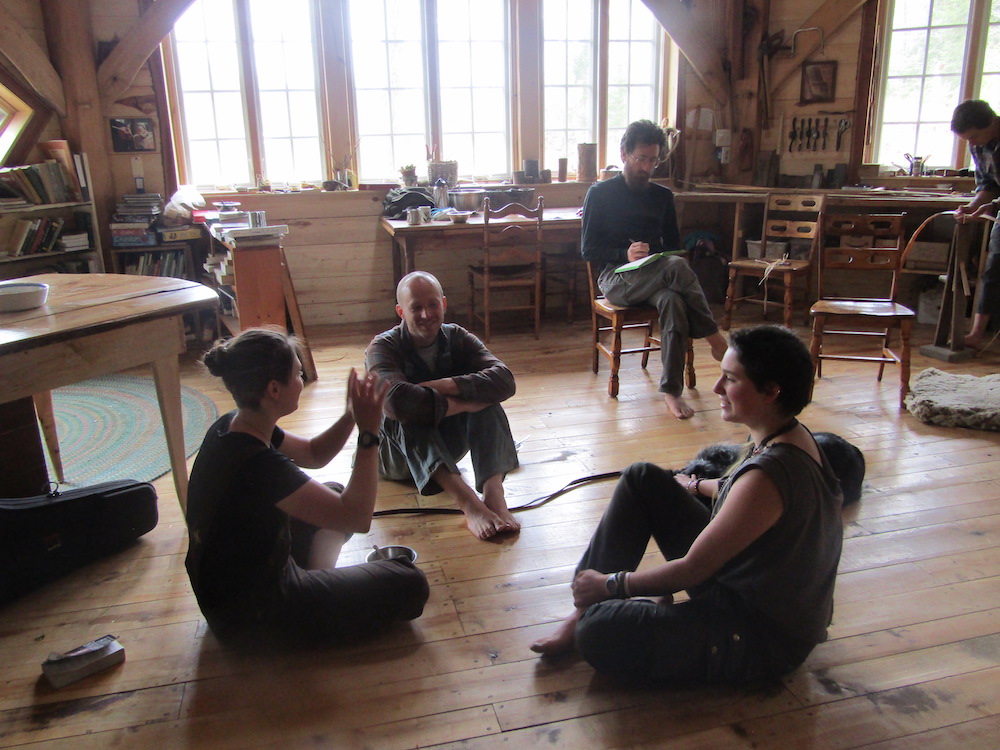
But by far the most impactful encounter we were lucky enough to have was with the grandmother. A smiling, owl-like face peeked over many fleece sweaters. She introduced herself as a member of the Ojibwe people. She spoke quietly of not knowing her parents, growing up in an Indian boarding school, and then being the first in her family to go to college. Then, she and several other students became involved in advocating for indigenous and environmental rights, starting a local newspaper named “Anishinaabe News”. She spoke of meeting her brother, a member of the Bureau of Indian Affairs, after a copy of her newspaper landed on his desk. She spoke of having to re-learn traditions she was robbed of as a child later in life from stories and elders. She was happy to talk with us about the indigenous names for plants and the differences between Ojibwe and settler culture.
“And I’m proud to say that the Ojibwe were some of the first to speak out.”
She spoke with a quiet, fierce pride and bravery. We were happy to listen.
Goodbyes – a poem by Cole
Goodbye, goodbye, goodbye to the world we’ve known for so long
Goodbye to the earth lodge
Goodbye to friends made along the way
Goodbye to the land that has held us
We say goodbye to this wonderful place
And welcome the wisdom of the Penobscot River
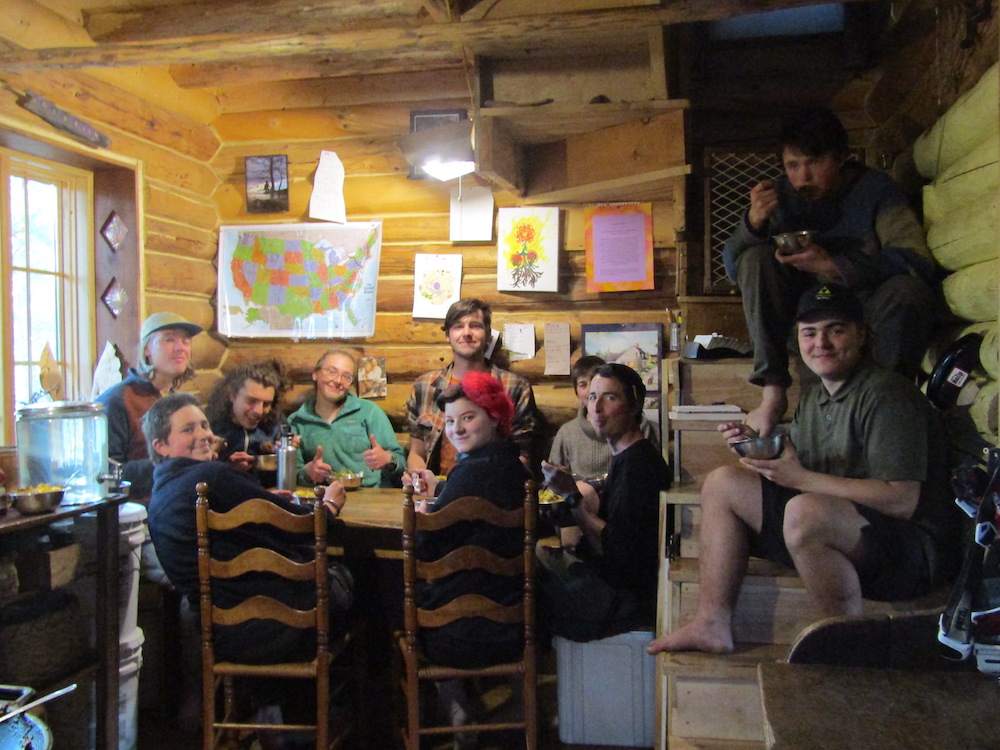
The Knapp Family (Pamela, Ashirah, Chris and Owen) and Semester gathered for a meal

